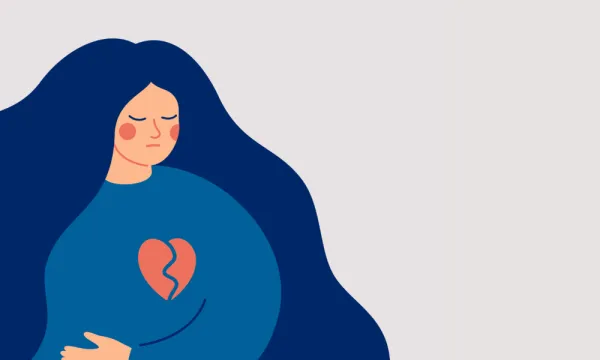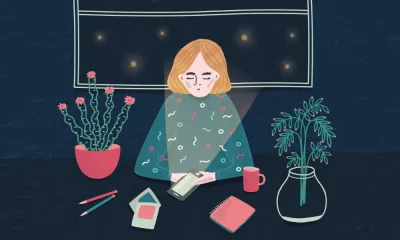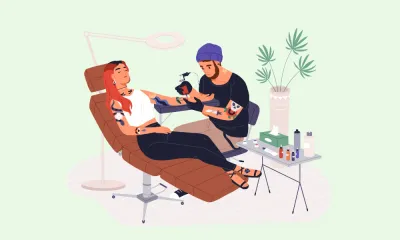There’s no way around it. Breakups hurt. A lot.
No matter what the different reasons were behind the decision, the pain of ending a relationship hits you like a truck. Every happy memory you’ve ever shared with the person you love floods your mind. You feel like you’ve made a huge mistake and reason that maybe there’s still hope that you will get back together.
As the days drag on, you reach out to them and get radio silence in return. Your self-esteem is on the floor over this romantic rejection.

You go down a social media stalking spiral, obsessively checking their feed to see if they’ve deleted or replaced you. It’s difficult to eat or sleep as you replay the recent breakup and wonder if the other person’s feelings are the same as yours. The emotional pain is almost unbearable and you lay in bed overwhelmed by the negative emotions.
Things to know
- Breakups are painful and lead to feelings of grief, which can be similar to the grieving process of a physical death.
- Science behind breakups shows that our bodies respond with acute distress and activate the same regions as physical pain.
- The drop in hormones such as dopamine and serotonin after a breakup leads to feelings of sadness and obsession with the ex, which is an evolutionary response to avoid loneliness and increase chances of survival.
It’s not a pretty sight. But it’s actually a fairly common reaction, so why does it hurt so much? Let's take a look:
- The Stages of Breakup Grief
- The Science Behind Breakup Pain
- Why It Hurts So Much
- How to Heal From a Painful Breakup
- Final Thoughts
The Stages of Breakup Grief
When we lose a relationship, we lose a loved one. People who go through a relationship break-up report similar feelings to grieving a physical death. It might be a living loss, but the emotional pain is no less jarring.

That’s why after a breakup, many people follow the traditional five stages of grief: denial, anger, bargaining, depression, and acceptance.
Denial
In the first stage of the grieving process, you are in shock. You feel completely numb and can’t wrap your head around what has just happened. There’s no way you can imagine life without this person. You reason that this will all blow over tomorrow and everything will be as it was.
Anger
It finally sinks in. Your relationship is really over. You search for something or someone to blame and feel cheated and wronged by your partner and by life. There must have been some mistake. You can’t believe this has happened and seek a way to express your hurt and anger.
Bargaining
Your emotions become too overwhelming to bear. You start looking for a way out of this pit. You start asking yourself “what if” and try to find compromises and solutions. This is the stage of false hope.
Depression
Despite your best efforts, you realize it’s unavoidable: your beloved relationship is really over. Powerless and defeated, you feel utterly crushed and cry at the drop of a hat. The sadness feels all-consuming and you can’t imagine resuming your normal daily life in the face of this loss.
Acceptance
Eventually, you reach the final step of the grieving process: acceptance. You can acknowledge your pain and reflect on the relationship without falling apart. It is bittersweet, but you are grateful for the love you and your ex once shared and feel ready to move forward without them.

How is it possible that so many people worldwide can suffer the grief of a painful breakup, yet continue living their everyday life? Why do we feel like the only human in history to hurt like this when so many of us share the experience? What can we do to stop the pain and heal a broken heart?
Researchers have explored the answers to all these questions and more, and the results might surprise you.
The Science Behind Breakup Pain
If you’ve ever grieved a past relationship, you might be familiar with feeling physical pain over the loss. This is no accident. It turns out that we are biologically wired to respond with acute distress when we endure a relationship breakup.
Brain scans have revealed that the same regions light up when we are experiencing physical pain and also become active when we process breakup pain. This suggests that our bodies literally cannot tell the difference between the two.

No wonder we feel like we’ve been gut-punched when we think about a former partner.
And it doesn’t stop there. There is scientific evidence that the newly single can resemble drug addicts going through withdrawal. Studies have shown that our “happy hormones” crash right after a recent breakup.
When we’re going through a painful breakup, our brains pump the brakes on producing dopamine and serotonin, the neurotransmitters that control pleasure and happiness. This chemical response gives us crazy cravings for our exes. In a way, we are addicted to them.
So if you’re obsessing over your ex, you’re not going crazy. You can blame your whacked-out brain imbalance for the feelings of sadness and fixation. Research has shown that without those hormones, we go through something like clinical depression and can’t think about anything else.
Why It Hurts So Much
But why do our bodies betray us? Aren’t we already having a hard time without our mental health making it worse?
Researchers theorize that these neural reactions are the result of evolutionary survival instincts. Humans aren’t meant to be alone. Our species depends on having social bonds and sexual relationships.

We are more likely to thrive together than alone. Back in the prehistoric days, romantic rejection could mean the difference between life and death. Shelter, food, and protection were necessary to survive the harsh elements. That could be why even a friendship breakup can hurt as much as a romantic relationship breakup. We evolved to associate relationship loss with physical danger.
What about in daily life? We’re independent creatures. There’s no need to have a partner to survive anymore. Yet modern breakups still make us feel like we’re going to die.
There are lots of different reasons we have a hard time when we suffer the loss of romantic love.
Many people find that they dream of their ex after a breakup, which can cause a lot of continual pain even if that person tries to move on.
This is someone who you spent countless hours with. Maybe even years. You know each other better than anyone else. From the way their hand feels in yours to the reason they love their favorite song, you are intimately familiar with one another.
You have your own little language of inside jokes and memories no one else shares. They’ve told you secrets no one else knows, and you’ve shared your deepest hopes and fears with them in return. This is the first person you want to share good news with, and the last person you want to talk to before you fall asleep.
These kind of intense and passionate relationships can leave people with a little condition called oneitis, but that's a topic for another day.
How to Heal From a Painful Breakup
Where does all that love go after you break up? How do you change your routine when they are no longer a part of it? Will things ever get better?

Here’s what NOT to do when you’re starting the healing process.
Avoid jumping right into a new relationship. It might feel tempting to numb the pain by immediately replacing your romantic partner with a new person, but this is not a sustainable solution in the long run.
It’s called a rebound relationship for a reason. The pain will snap back and hit you just as fast when things fall apart as quickly as they started. You’re more likely to build a healthy relationship that will last after you go through the healing process.
Try not to take your feelings to social media. When you’re dealing with a breakup, your emotions are all over the place. From denial to depression, you are pinballing between the stages of grief.
This is a common reaction, but taking it public can be a huge mistake. You don’t want to drag your ex or detail the drama to mutual friends only to regret it later. Be wise before you pick up the phone when your feelings are still raw.
Don’t neglect your mental health. You might want to show your ex what they’re missing with a physical transformation, but while you’re hitting the gym, don’t forget about strengthening what’s on the inside. Physical health matters, but emotional support is just as important when you’re grieving.
Take the time to process all those negative emotions and reflect on all the different reasons things didn’t work out. Understanding what went wrong in your past relationship is critical to recovering and successfully moving on from a former partner.
So what should you do instead?
Focus on personal growth. Think about all the things you wished you could do when you were together but couldn’t for whatever reason. Did you dream of getting a dog, but they were allergic to pet hair?

Maybe you love going to live music concerts, but they always hated being in crowds. Or you always wanted to travel the world, but your former partner preferred to stay close to home.
Whatever held you back before isn’t a problem now. You’re free to explore those parts of yourself that you may have been neglecting in your past relationship. Take the time to get to know yourself again as you relearn who you are outside of your romantic partner.
As time goes on, you’ll start recalling all the things you didn’t love about your ex. The way they were always late. How they never wanted to try new restaurants with you. The fact that they didn’t get your taste in clothes.
These are not things to regret or be irritated about. Instead, think of them as helpful clues to the traits you do want in a romantic partner. Remember what you’ve learned from your previous relationship so you can make better choices in the next one.
One of the best things you can do when you’re nursing a broken heart is to lean on a trusted friend or family member for support. In the midst of a painful breakup, the last thing you might want to do is talk about your feelings. Many times, we want to withdraw to our rooms and process the deep hurt all alone.
We feel that no one could possibly understand what we are going through and there is no point in burdening those around us with our depression. This is exactly the opposite of what we should do when we are feeling down.

Our close friends want nothing more than to be there for us through thick and thin. If they know you are going through breakup pain, chances are they would do anything to help you recover. No one wants to see someone they love go through a hard time alone.
You don’t have to tell them everything, but just getting out of the house and being with friends or family can be enormously helpful. If you aren’t ready to talk about how you feel, tell them that. A trusted friend will respect your wishes and come up with a plan to take your mind off the recent breakup instead.
Don’t be afraid to let people into your healing process.
Sometimes, there are things we don’t feel comfortable telling our close friends. Consider seeking professional emotional support if you find yourself hesitant to share details with those who know you well. Therapists are experts when it comes to counseling people through painful breakups.
They can offer a new perspective on the situation that you might not have even considered. This is particularly important if your ex didn't treat you well. If it was an abusive relationship, your self-esteem probably took a big hit. A clinical psychologist is a trained professional that can help you work through the damage your former partner has done.
Taking intentional steps to unpack the abuse is vital to leaving the past behind and making better choices when you’re ready to find a new romantic partner.
Final Thoughts
There is no shortcut to getting over a breakup. It’s the death of a dream and the loss of a loved one. There might not be a funeral to attend for your relationship, but that doesn’t make your grief any less legitimate.

So treat yourself as you would a close friend. Be gentle with yourself. Don’t beat yourself up over mistakes or regrets. Think back fondly on your happy memories, and release the sadder ones. Accept that everything was meant to be, just not made to last.
The healing process is slow and unsteady. Don’t rush through it. Embrace the feelings as they come, no matter how confusing or uncomfortable they may be. You are building back a better version of yourself, whether it feels that way or not.
Most of all, remember to find hope. That little voice inside of you that says the sun will come up tomorrow and you can try again. Trust that what’s meant for you will find you in the right way, at the right time. Love yourself first. The rest will follow.









